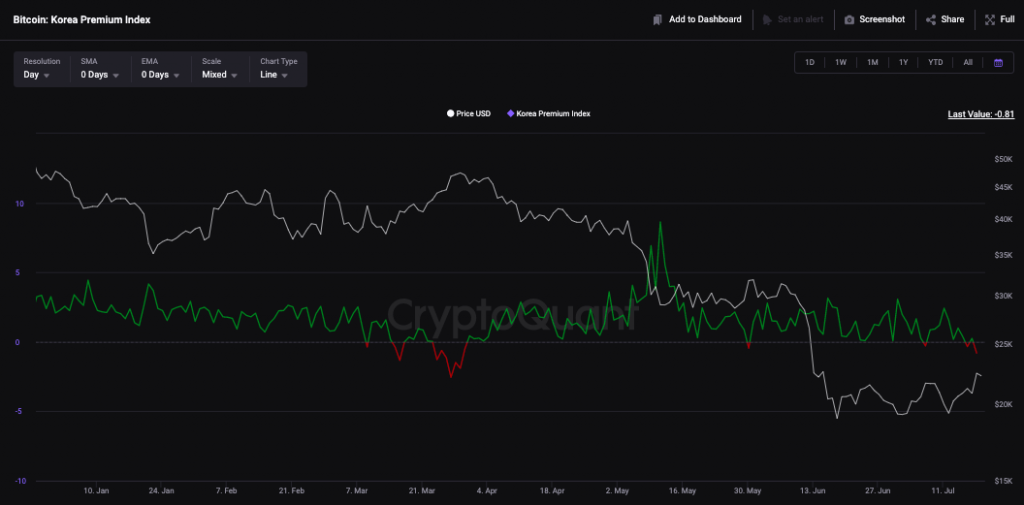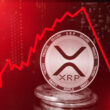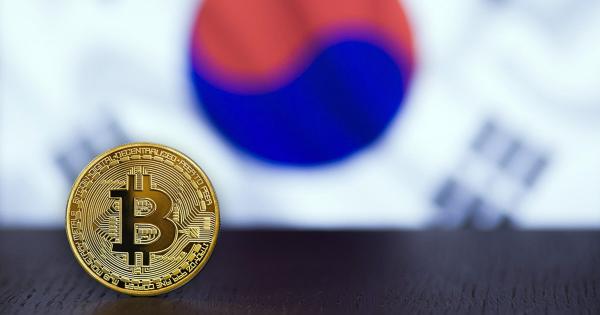The South Korean market has always played a crucial role in shaping asset prices during the eastern trading hours. On exchanges like Upbit, trade volumes are currently hovering around their weekly peak, bringing to light the picking-up pace of crypto transactions. Among all virtual currencies, Bitcoin remains to be one of the most traded coins.
As a result, to gauge how South Korean market participants are behaving, the Kimchi Premium Index [KPI] was developed. It basically points toward the price gap between South Korean exchanges and other exchanges around the world. So, a rising number indicates the presence of buying bias. In such a scenario, Korean market participants usually fork out more than usual funds to acquire Bitcoin. Conversely, when bears control the strings, Bitcoin trades at a discount on the index.
Now, since the beginning of this year, the KPI has been trading in green most of the time. Only in mid-March and briefly towards the end of May, did the reading fall into the negative territory.


Now, as illustrated above, Bitcoin’s KPI is back in the red terrains. At press time, it stood at its lowest level, -0.81, since 29 March. However, this time, an external factor may have pulled the trigger.
Bitcoin Kimchi Premium traders to be prosecuted?
Well, it is a known fact that opportunistic traders usually make use of the Kimchi Premium by buying Bitcoin from OTC traders overseas and then dumping them on exchanges like Upbit to relish profits.
Now, in what is the latest development, a South Korean financial regulator is targeting Bitcoin Kimchi Premium traders and intends to prosecute the guilty. Per a recent report from The Segye Ilbo, the Financial Supervisory Service is investigating a couple of transactions believed to have been made by Kimchi Premium traders.
Notably, the first transaction involved $993 million and it was carried out using the domestic bank Shinhan. The second was worth approximately $611 million and was facilitated by Woori Bank. The report noted,
“… the FSS estimated that the abnormal foreign exchange transactions of 1.3 trillion won and 800 billion won, respectively, at Shinhan Bank and Woori Bank were aimed at the ‘kimchi premium.'”
Both the banks marked the transactions as suspicious and reported them to the regulatory agency. Even though no exact indication was given as to when these transactions were executed, it is believed they could have taken place when the Kimchi Premium was at its peak a couple of years back. Back then, Bitcoin was approximately 30% more expensive in South Korea when compared to the global average.
So, what next?
Per Segye Ilbo’s report, The FSS believes that the traders might have sought to cover up their actions by sending their profits abroad. In an attempt de-rail regulators, it seems like the participants also sent fiat to offshore accounts in China and Japan.
Furthermore, the traders allegedly attempted to veil their actions by using a host of companies as middlemen. They reportedly told the banks that they were paying for “imported goods such as gold bars.”
Now, the FSS has conducted several “on-site investigations” as part of its probe and has shared the investigation findings of both cases with the prosecution service.
So, with the guilty under scrutiny, fear has likely spread like wildfire among Korean Kimchi traders and it might be a possible reason why the index is trading at a discount at the moment. With the case remaining open, market participants would likely continue steering away from getting into arbitrage Bitcoin transactions. Resultantly, the current high volumes can be expected to deflate. And, the asset might continue consolidating over the next few days during the eastern trading hours until the FUD is completely wiped out.
At press time, the said phenomenon was already in play as Bitcoin’s price remained unchanged when compared to the previous day and was trading at $22k.
Read More: Post the 15% rise, is Bitcoin’s path all-clear to continue rallying?





